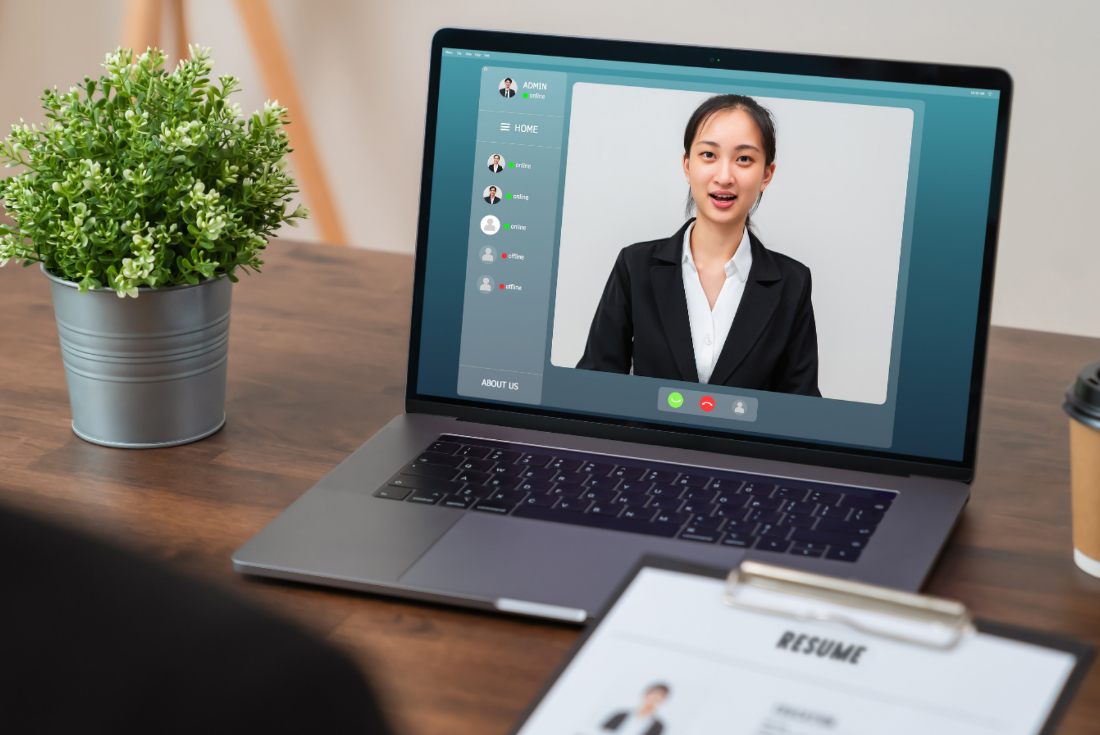Recruitment is changing
It’s evident that a lot of things about recruiting are changing— and it’s all happening rapidly. Organisations are pivoting to virtual recruiting so they can continue to vet candidates from a safe distance. Video interviews are a natural fit for any team’s online talent acquisition strategy. This is why it is essential to know how to prepare for a video interview.
While the perks are apparent right now, as people are turning to video conferencing tools for everything from fitness routines to school classes, we know the trend of the video job interview isn’t going to fade any time soon. Even once the health crisis ends, organisations will continue to use video interviews to save time and money while engaging with candidates both near and far. A year from now, many of us will be wondering why video interviews had not become a standard practice much earlier!
Video interviews are the way forward
Of course, any time your team adopts a new technique, you want to be sure you’re getting the most out of it. Video interviews can be a spectacular way to make genuine connections with candidates from a safe distance if you know how to approach it correctly. Fortunately, we are not new to the concept of video interviews as here at Peaple Talent. We use the medium of video to promote our Tekcurious events/Podcasts and the roles we are supporting our customers.
We thought we would share some of the wisdom we’ve accrued over the years, which will help you provide the same high-quality candidate experience you’ve always aimed for.
Here are six things everyone needs to know about video job interviews.
#1 Prepare for the interview questions.
One key thing to keep in mind about a video job interview is that the ‘job interview’ part is way more important than the ‘video’ part. Don’t get so hung up on the video aspect that you don’t prepare your questions. Hiring Managers should prepare for a video interview the same way they would for any other type of interview. To provide a consistent candidate experience and ensure candidates are treated fairly, it’s best to script your interview questions in advance and keep them in front of you when conducting video interviews.
#2 Dress appropriately and set the scene.
While working from home during the pandemic, many people are living in the first thing out of the wardrobe. That might work just fine for most of your tasks, but if you’re conducting a video job interview, you need to dress the same way you would for an in-person interview (at least from the waist up). You’re still representing your organization, and you must put your best foot (or, in this case, face) forward. Your professional appearance isn’t all, though. Consider the background of your video set up; clean up your office if necessary or move to a different location with a bare wall behind you (kitchen table, etc.). Some video tools (like Zoom) even allow you to set custom virtual backgrounds so that you can replace your bare wall with a wall of bookshelves or tidy office space.
#3 Test your technology.
We’ve all experienced the frustration of technology going south! Help cut down on tech troubles during video job interviews by testing your setup in advance. Make sure your mic and speakers are working, and that you have a strong internet signal. Move to a different location in your house or office if necessary. If you haven’t conducted a video interview or conference in a while, you may even want to ask a colleague to do a test run with you to ensure everything on your end is working smoothly.
#4 Communicate expectations.
Every good hiring manager understands that communication throughout the recruiting process is a massive contributor to a positive candidate experience. Don’t skimp out when it comes to communicating around video interviews. Before interviews, let candidates know what to expect. Make sure they have thorough instructions on joining your video platform and let them know the purpose of the interview, such as whether it’s a preliminary chat or prescreening, hiring manager interview, technical interview, etc. Sharing these expectations helps candidates prepare themselves for the interview, which will make the whole process more efficient and enjoyable.
#5 Be yourself.
Video is the next best thing to meet in person, so recruiters need to be authentic, friendly, relaxed, and confident during video job interviews. This helps set the tone and put candidates at ease, even if they aren’t as enthusiastic about being on camera. Think about all the things you do when you meet a candidate for an in-person interview: you smile, shake their hand, and lean forward to show that you’re listening. Mimic the same body language during video job interviews. You’ll have to trade the handshake for a wave, but these gestures will help you earn candidates’ trust.
#6 Follow up and follow through.
What happens after the video interview is almost as important as what happens during the interview, at least as far as candidate experience goes. Don’t leave candidates hanging after the fact. More than half (62%) of job seekers want the entire recruiting process to take two weeks or less, according to Glassdoor, so it’s essential to keep in touch after the interview. Thank the candidate for meeting with you and letting them know when they can expect to hear a decision. Additionally, ask for feedback on the video interview process by inviting them to complete a feedback survey. You’ll collect valuable insights that help you improve your video interviews in the future.
Did video kill the telephone star?
Once you’re comfortable conducting video interviews with candidates, regardless of where they live, there may be no reason to keep doing phone screenings. In the time it takes to prescreen a candidate over the phone, you can easily hop on a video platform and get an even better sense of who they are and what they have to offer. With the right preparation and communication, you can continue delivering a top-notch candidate experience, even if you never get to meet your candidates face-to-face. As your virtual recruiting strategy improves over time, so too will the quality of your video interviews as well as the quality of your hires.

Get articles like
this via email
- Join 2,800 others
- Never miss an insight

